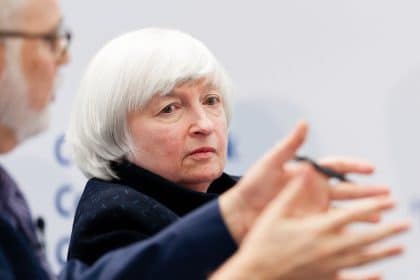Yellen’s comments questioning Bitcoin price stability and volatility came just at a time when Bitcoin (BTC) was under heavy selling pressure and further declining 16% from its all-time high in a very short time.
On Monday, February 22, US Treasury Secretary Janet Yellen issued a warning that Bitcoin (BTC) poses to its investors. Yellen said that there are some important underlying questions about Bitcoin’s stability and legitimacy. Speaking to CNBC’s Andrew Ross Sorkin at a New York Times DealBook conference, Yellen said:
“I don’t think that bitcoin … is widely used as a transaction mechanism. To the extent it is used I fear it’s often for illicit finance. It’s an extremely inefficient way of conducting transactions, and the amount of energy that’s consumed in processing those transactions is staggering.”
The Bitcoin mining activity involves the use of high-end machinery to solve the algorithm and add blocks to the network. This high-end machinery also consumes surplus electricity in the process. Thus, Bitcoin critics have always pointed to the energy used in the Bitcoin mining activities.
Also, Bitcoin’s volatility has always remained a point of criticism for lawmakers. As of date, Bitcoin continues to remain a highly volatile asset class despite strong institutional participation. Considering the recent example, the BTC price tanked 16% later on Monday, February 22.
From its all-time high of $58.3K Bitcoin (BTC) has slipped below $50,000 levels in less than 48 hours. With this Bitcoin (BTC) also loses its status of being a trillion-dollar asset class. At press time, BTC is trading at a price of $49,762 with a market cap of $921 billion.
“It is a highly speculative asset and you know I think people should be aware it can be extremely volatile and I do worry about potential losses that investors can suffer,” Yellen said.
However, Yellen remains positive about digital currency technology and its inclusion in the payments system. “I think it could result in faster, safer and cheaper payments, which I think are important goals,” Yellen said.
Market Analysts Undeterred with Views of Yellen on Bitcoin
Crypto market analysts have been calling out central banks for printing money out of thin air under the pretext of boosting economic activity. Concerns about inflation have already pushed financial institutions and corporate closer to Bitcoin (BTC). Soon after Yellen’s comments on Bitcoin, Rich Dad author Robert Kiyosaki said:
“Sec Treasury Janet Yellen states: “Bitcoin is extremely inefficient.” Give me a break. Does she think printing trillions of fake dollars is efficient? Does she not know the more fake dollars she prints the more efficient and valuable Bitcoin becomes? God bless her”.
Just before the interview, CoinShares chief strategy officer Meltem Demirors spoke to CNBC. She said:
“The regulatory issues have been around for a long time, we’ve been dispelling them for a long time. At this point, our belief is: Bitcoin is not a question of if, but when. We certainly believe, you know, the best time to invest in bitcoin was yesterday — the second best time to allocate is today”.
Other news from the cryptocurrency world can be found here.
next